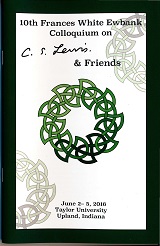Event Title
Paper Session 6-A: MacDonald and Friends (2)
Location
Euler 100
Start Date
4-6-2016 10:45 AM
Description
"Upon Further Examination: Identifying and Describing the George MacDonald Holdings at the Center for the Study of C. S. Lewis & Friends." - Blair Hedges
"Awaking the Reader to Nature's Aesthetics: A Novel Purpose in The Seaboard Parish" - Cynthia DeMarcus Manson
Though full of lush description, George MacDonald's The Seaboard Parish (1868) may strike the reader as a novel without a plot, and expression of the author's own ebullience at the seaside, where his family took a vacation in 1867, but with little incident and development of character. To the contrary, a closer examination reveals the novel's well-wrought structure as well as informing purpose. MacDonald, through his minister narrator, strives to open readers' eyes to a radiant sensual glory that surrounds them in creation. The Seaboard Parish illustrates the minister's contention that "the loss of the human paradise consists chiefly in the closing of the human eyes" (116), while his two daughters learn to appreciate the commonplace and set aside morbid introspection in order to recognize the artistry of nature and the value of art.
"On the Friendship of Books: F. D. Maurice on the art of reading, writing, and friendship" - Robert Trexler, Jr.
In 1856, Fredrick Dennison Maurice, one of George MacDonald's greatest friends and mentors, gave a talk titled "On the Friendship of Books." His talk/essay presented different types of books and authors from different periods of history. Some (such as Milton and Spenser) are known as particular "friends" of George MacDonald and C. S. Lewis. But what according to Maurice, is essential for a book to be "friend-worthy"? This talk explores how one influential nineteenth-century Anglican priest/theologian approached the art of reading, writing, and friendship.
Event Type
Paper
Paper Session 6-A: MacDonald and Friends (2)
Euler 100
"Upon Further Examination: Identifying and Describing the George MacDonald Holdings at the Center for the Study of C. S. Lewis & Friends." - Blair Hedges
"Awaking the Reader to Nature's Aesthetics: A Novel Purpose in The Seaboard Parish" - Cynthia DeMarcus Manson
Though full of lush description, George MacDonald's The Seaboard Parish (1868) may strike the reader as a novel without a plot, and expression of the author's own ebullience at the seaside, where his family took a vacation in 1867, but with little incident and development of character. To the contrary, a closer examination reveals the novel's well-wrought structure as well as informing purpose. MacDonald, through his minister narrator, strives to open readers' eyes to a radiant sensual glory that surrounds them in creation. The Seaboard Parish illustrates the minister's contention that "the loss of the human paradise consists chiefly in the closing of the human eyes" (116), while his two daughters learn to appreciate the commonplace and set aside morbid introspection in order to recognize the artistry of nature and the value of art.
"On the Friendship of Books: F. D. Maurice on the art of reading, writing, and friendship" - Robert Trexler, Jr.
In 1856, Fredrick Dennison Maurice, one of George MacDonald's greatest friends and mentors, gave a talk titled "On the Friendship of Books." His talk/essay presented different types of books and authors from different periods of history. Some (such as Milton and Spenser) are known as particular "friends" of George MacDonald and C. S. Lewis. But what according to Maurice, is essential for a book to be "friend-worthy"? This talk explores how one influential nineteenth-century Anglican priest/theologian approached the art of reading, writing, and friendship.


